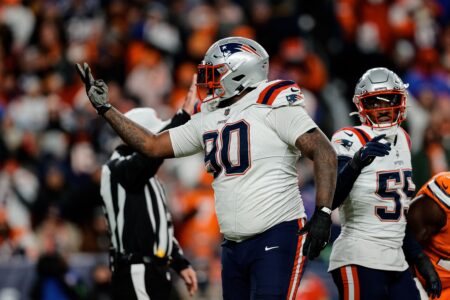captain stone
PatsFans.com Retired Jersey Club
- Joined
- Sep 29, 2004
- Messages
- 34,316
- Reaction score
- 27,615
Actually the seeds of decline had already begun with the 2004 NFL Draft. Aside from Wilfork, Watson, and trading a 2nd round draft pick for Corey Dillon, the 2004 NFL Draft for the New England Patriots was chock full of busts.
National Football League: NFL Draft History Full Draft - by Team
Not only the best player was not selected at the position (for instance Cedric Cobbs versus Michael Turner) but the teams needs were not prioritized (Marquise Hill in the second versus right tackle):
2nd Round Marquise Hill versus Max Starks
The New England Patriots entered the 2004 NFL Season with three stiffs at right tackle: Klemm, Ashworth, and Gorin. It was a miracle the Patriots won the Super Bowl with Gorin after Ashworth went down. The greater need for the was right tackle not an eighth defensive lineman in camp.
4th Round Cedric Cobbs versus Michael "the burner" Turner
Michael Turner was rated much higher than Cedric Cobbs who was a monumental bust.
Draft Countdown - 2004 NFL Draft Rankings
NFL Draft Scout Rankings, From Prep to Pro Coverage for Pros by Pros - Powered by the Sports Xchange
5th Round PK Sam versus Nick Leckey
The Patriots already carried five wide receivers on the roster during the 2004 NFL Season. A sixth wide receiver was not necessitated. Meanwhile, the Patriots needed a backup center with the departure of Damien Woody.
Draft Countdown - 2004 NFL Draft Rankings
NFL Draft Scout Rankings, From Prep to Pro Coverage for Pros by Pros - Powered by the Sports Xchange
7th Round Christian Morton versus Jabari Greer
Christian Morton was not even invited to the NFL Combines. That should speak for itself!
I completely agree. The decline of the Dynasty That Never Was began with the drafting of Ben Watson, their 2nd 1st-round TE in 3 years, instead of Karlos Dansby. If Bill wanted Watson that badly, then he could've traded his 2nd- & 3rd-rounders to move up sufficiently to take Watson in the 2nd round, similar to the Chad Jackson trade 2 years later.
Except for a decent recovery in 2005, the rest of the drafts have been piss-poor, to be generous. At least 2009 - with Chung (though a half-round over-drafted), Butler, Vollmer, Ingram & Edelman - is more encouraging.
















